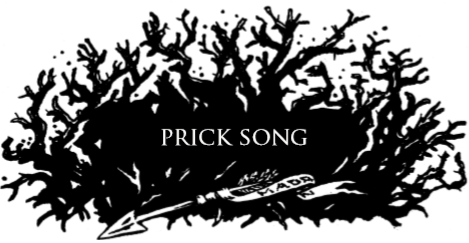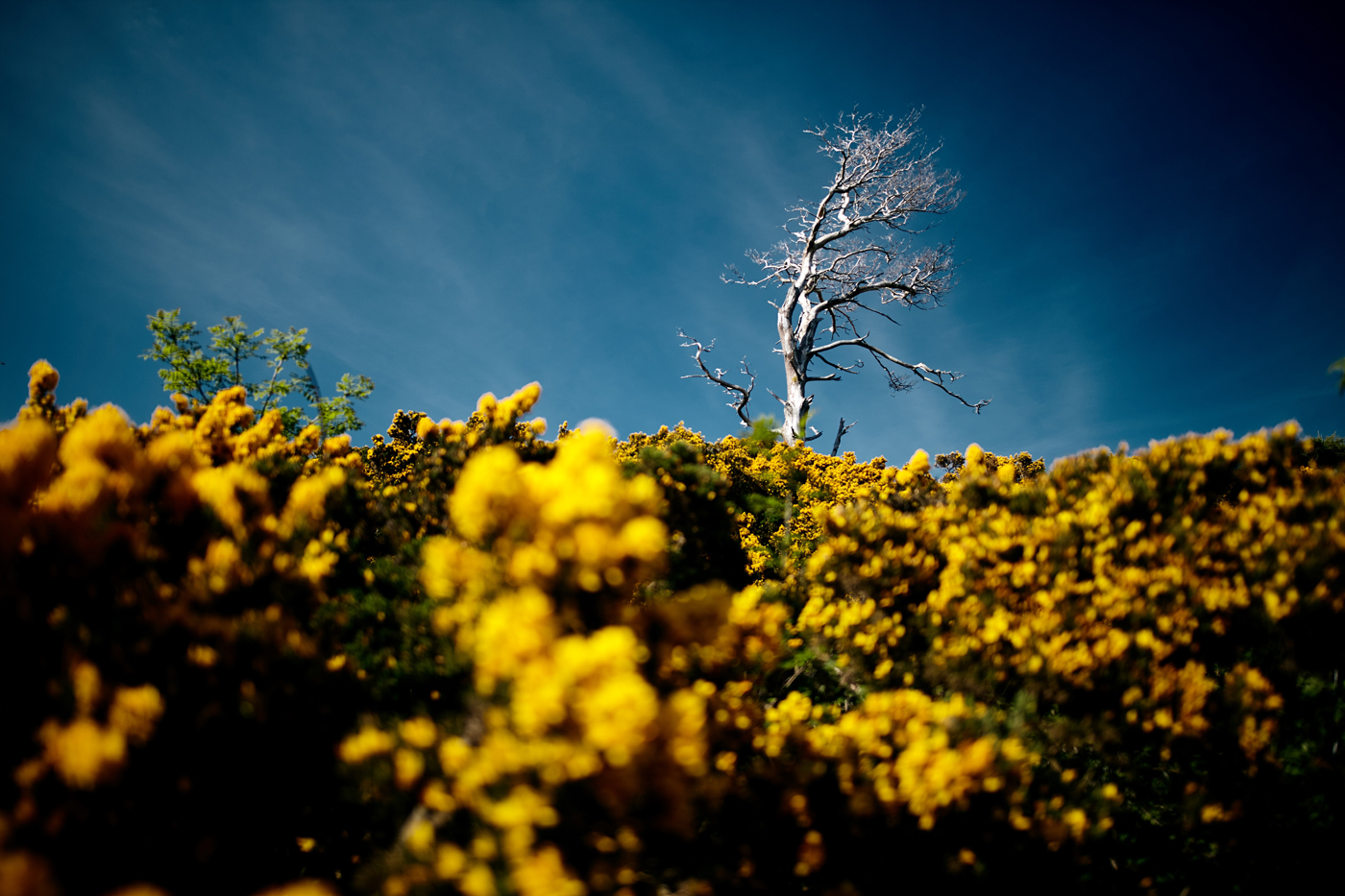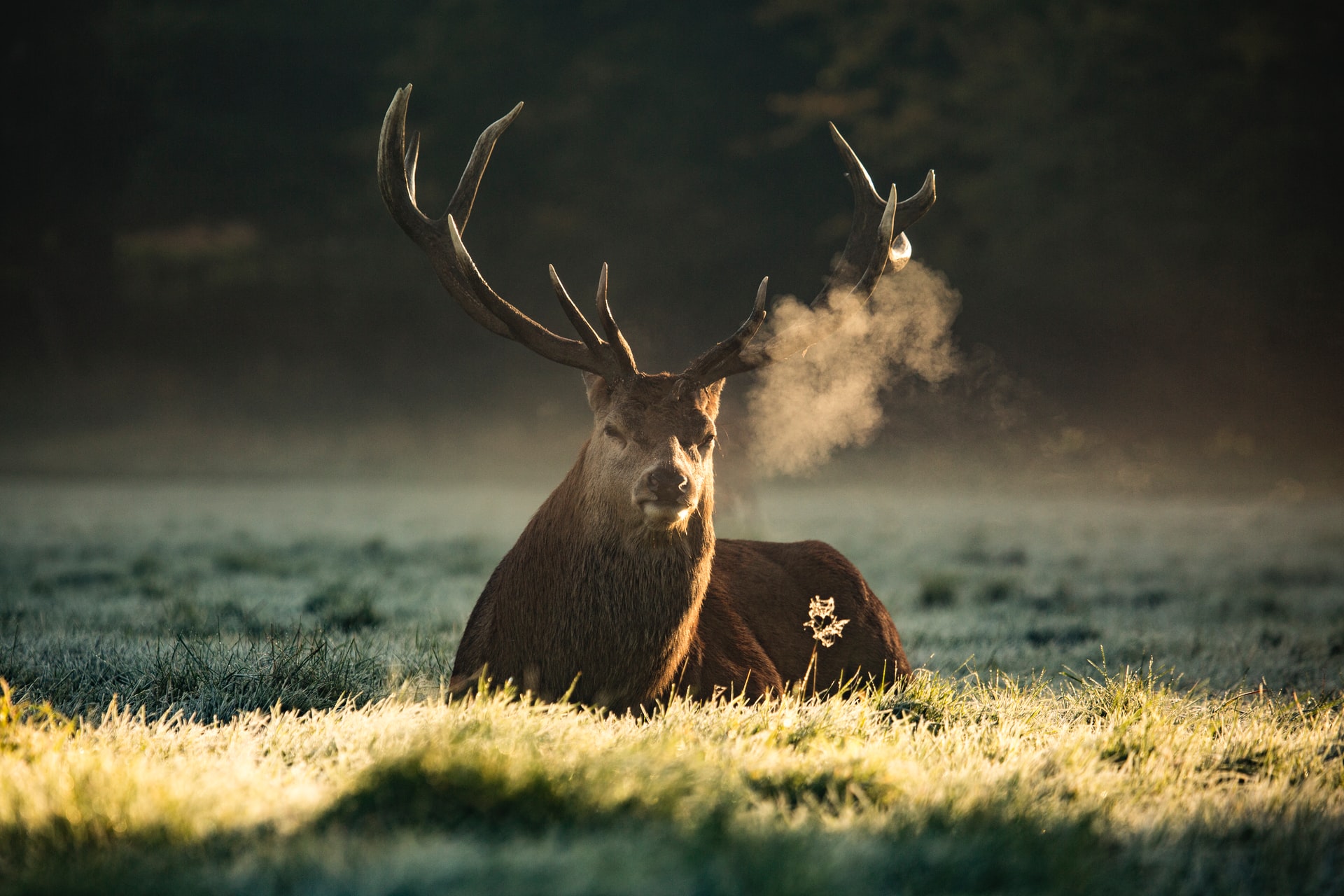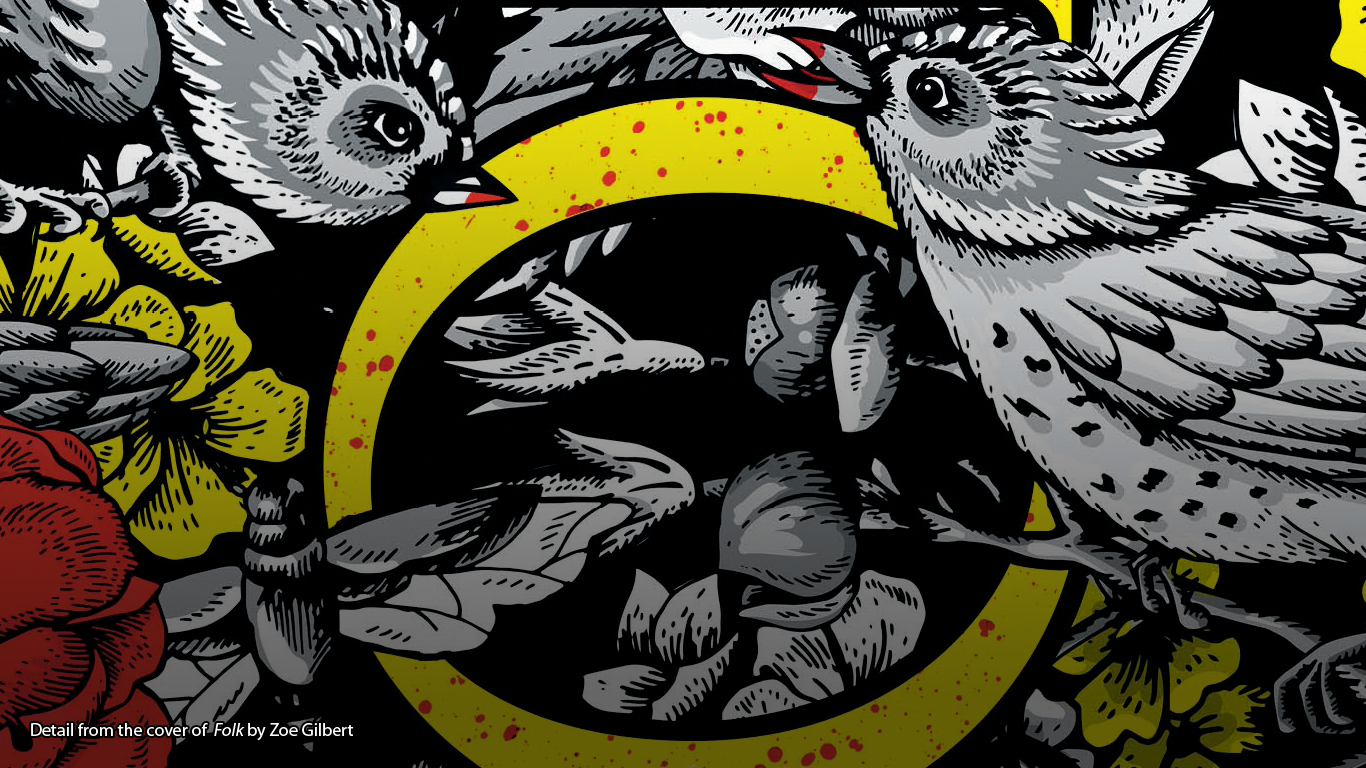The first tale of Zoe Gilbert’s wonderful novel, Folk, now out in paperback.
Read more about the novel here.

Listen, for the beat that runs through the gorse maze. It is an early twilight, the opening between last sun and first star, the door of the day closing until, soon, night will seal it shut. There are feet thudding in the gorse’s winding tunnels, hearts thumping in time. Above them the breath of boys hisses. Puffs of their steam are lost in spiny roofs. Their arms are clad in sleeves of ox-hide, hairy and black. The leather stinks. Elbows sweat. White shirts stick to skin, and newly shaved heads bob, tender amongst the prickly paths.
Four seasons of growth and the gorse has doubled her spines. She has grown chambers and passageways, whole rooms of thorn. She has twisted her maze so cruelly that not one boy has been able to learn it.
Among the beating feet, Crab runs. His soles are sliding on loose soil. He is a skinny stick of a thing, taking his first turn at the gorse game. The bone shows through his pale scalp. He may be smallest, but he is fastest, skidding where the last of the golden flowers speckle sharp corners and hillocks. As the blue light deepens, he swivels at dead ends, ducks through scratching arches. Here and there, he passes other boys, thrusting leathered arms into the gorse, bare fingers fumbling, wincing as the thorns prick.
Crab has not dived yet. His eyes search the darkest parts of the gorse. When he finds what he wants, his dive will be headlong, the boldest of them all. Gorse Mother, he whispers, between hot breaths.
Look now, down the hill, below the prickly forest with its flickers of yellow petal, to where the girls are waiting. They stamp their boots in the heather. They twang the strings of their long bows, pretending at arrows, then stretch the strings until they snap. With these bows they have speared real arrows deep into the gorse, lodging amongst the thickest parts. The tattooed ribbons tied to them flutter against the gorse’s black needles. Some girls have weighted their arrows with nails to make them go further and deeper. All of them have stitched their names on to the strips of cloth. A few have added a red dot, the thread broidered over and over to make a nub, which tells the boy who finds it that it is not only a mouth-kiss he will get when he returns.
All the girls want their kiss to be the reddest: a kiss from a boy who has dived so deep for her arrow that his lips have been pricked into a bloody pincushion.
Werrity Prowd gathers the other girls together. Her eyes are sly, her lips pursed into a pout. ‘Who d’you want to kiss?’ she asks each girl in turn: Plum, the orphan; Linnet, the golden harvest queen; March and Grey, the scowling huntsman’s daughters. They laugh and whisper names.
The last to be asked is Madden Lightfoot, the stable girl. This year is her first with the arrow shooters. Her ribbon was the yolk yellow of gorse blossom. ‘You can’t choose who finds your arrow,’ Madden says. ‘And I won’t tell who I’d want to kiss, anyway.’
Werrity sneers at her, crossing her arms over her round belly. ‘Just because you’re pretty, don’t think you’ll get the best boy. He’s for me.’
‘Hussy,’ Grey hisses.
‘Not had your fill of them?’ asks March, and pokes Werrity’s belly with the tip of her bow.
Turn away from the heather slope, to the seaward side of the hill. Sniff the air, catch the smoke. The men and women are already lighting torches, passing them along the line. All the villagers of Neverness are here: fishers and farmers, shepherds and huntsmen, fowlmonger, fiddler, brewer and beekeeper, seamstress, midwife, miller and bard. Every year they gather, while the girls shoot their arrows and the boys hunt them out, racing in the gorse. They are hungry for fire and begrudge the wait, but custom is custom. When the youngsters’ game is over, and boys and girls are paired for the night, one kiss for each ribbon, they will make their thorny Gorse Mother blaze.
Come inside the gorse maze and take another taste of the lust that is driving feet faster on the paths. It is boys’ lust for coy, buried ribbons. It is lust, too, for something darker. Gorse Mother. Night is falling and eyes are growing wild. There are whimpers as bare heads and leather-clad arms plunge into the nests of thorns. There are gasps at the thrill of pricking pain. legs flail in panic when the spikes impale and trap a boy, who slithers out of his shirt. The others do not raise their heads as one runs from the maze, waving a beribboned arrow.
Down on the heather slope, Plum, the girl who made it, beckons him into the purple dark. The other girls crane to get a look at his lips, to know she will not cheat and bite her own mouth until it bleeds.
Crab is stumbling up there in the maze, ox-hide sleeves slipping down over his hands. He has seen the grazed head of the boy who ran down the hill. He has smudged the beads of blood that well from his own fingers. retracing the warren, feeling for roots and twisted trunks he might recognise, he tries to find the ribbon that is lodged deepest.
He spots a white one, buried far inside a cave of thorns. It is more than his body’s length away from the path. To reach it will mean more than scratches. Skin will tear. Crab balls up his hands inside the sleeves and pushes in.
Take a torch, the last to be lit, and follow the jostle of fat, spitting lights, as the men and women of Neverness spread out along the gorse edge. The air is riddled with spiteful shadows – the wounds and fears and furies of a village year – jinking between the people of Neverness, pulling their hair, tripping them up. The gorse-burning will smoke them out, cleanse the air for another season’s turning.
Only a few girls still wait below, in the heather. Grey kicks at March’s toes and they jab each other with their broken bows. Werrity Prowd still glowers, squinting for boys that might come flying down the slope. Madden stands apart, staring up at the sky.
‘How many left, now?’ A man’s voice calls down towards the heather. The wind whips away his words and drowns them in the sea.

All autumn, Crab has twitched in his sleep, racing in dreams through the gorse maze, baffled by ribbons that slide away from his fingers. It is only on the day before the burning that he finds out what he must do to win.
Crab runs breakneck to the ale room, in time to find the trapdoor still wedged open. From the cellar come the shouts of boys. He slithers down into a tumult of flying shirts and ox-hide sleeves batted about heads. The cellar stinks of animal skin and boys’ sweat, the fug of beer from the barrels. Crab ducks into the sack that is open on the floor and grabs the last roll of ox-hide. It is hairy and black, stiff as tree bark.
A boy Crab knows, Dally Oxley, sees him pick the sleeve up. ‘They’ll be a pair, if you can find the other,’ he yells over the din. ‘Take what you can get, I would.’
Crab nods and slides the hide on to his arm. It is loose, made for bigger bones than his. The broadest boys have taken the best sleeves and, with them laced on, duel with their forearms. He sees Sandy rincepan sitting astride a barrel, while Drake, the handsomest of all the seven Webbe brothers, drags a blade through Sandy’s hair, tufts of it feathering on to the floor. Most of the others have already shaved their heads. Dally Oxley points to his own bare skull. ‘Do yours, if you want? Did Pie’s for him just now.’
Pie is Dally’s older brother by two years, but is twice his size. Crab shakes his head. ‘Getting mine off tonight,’ he says.
The fighting and yelling come to a halt. One of the boys has seen a face peering down in the light from the trapdoor and hushes the others.
‘If Pie Oxley’s down there, tell him I’m stitching a red dot thick as a currant for him,’ the voice says.
Someone whistles from a corner. Drake Webbe calls, ‘What about me, Werrity?’
‘You’ll be lucky,’ the girl says, and vanishes.
‘And those girlies think this is all for them,’ Dally says to Crab. He balls up a crumpled white shirt and chucks it over. ‘All so’s we can beg a kiss off them and get half-flayed for it.’
‘I’d not want a kiss off Werrity,’ Crab says. All the boys have kissed Werrity Prowd. She helps her ma upstairs in the ale room, handing out sly looks with cups. Her mouth is always puckered into a pout, ready. But it is Madden Lightfoot that Crab has watched all autumn long. She is apprenticed beside him at the High Farm stables. Madden has grown taller and stronger than him the last few months. Her legs and arms are still bread-brown from a summer’s sun. She is bolder with the horses. When she whispers into the colt’s ear, Crab wishes it were him she coaxed.
‘Nah,’ says Dally. ‘We’ll give them girlies their kisses. but you want the same as what all of us want.’
Around Crab a chant begins to beat.
Gorse Mother, Gold Mother. Prick your mouth. Lick our spit.
The boys gather around Pie Oxley. He stands in the middle of the cellar, a head taller than any of them. Three times before he has run the gorse maze; his scalp and bare shoulders are covered in red freckles. He grabs the crotch of his trousers and mimes a groan of pleasure. Dally and the other boys whoop.
Gorse Mother. Gold Mother. Let me prick. Prick me back.
‘She’ll come back for me,’ Pie shouts, and gives a deep groan, grinning all the while.
‘That’s what lucky is,’ Dally yells to Crab over the thrum of chanting voices. ‘Not a kiss from a girlie in the heather. You want the Gorse Mother to get you.’
Crab stares at the freckles on Pie’s long, hard back as he turns around, raising his arms and beating his fists with the chant.
‘Pricked him all over she did,’ Dally says, close to Crab’s ear, ‘before he got his turn with the pricking. She’s a mouth like a bowl of mulberries. All juicy. Swollen up fat from chewing on thorns. And she puts it on you and it’s like ten mouths all at once. You go in the gorse and if she gets you, you come out a man.’ Dally looks at his brother with envy. ‘Bowl of mulberries,’ he says.
The chanting goes on. Gorse Mother. Prick Mother. Drink me deep. Drink me up.
‘How do you get the Gorse Mother?’ Crab asks Dally.
‘Got to be the bloodiest. Be pricked to pieces. She’ll wait till the burning’s nearly on her, and if you’re bloody enough, she’ll come.’
Pie Oxley has writhed his way to the row of beer barrels. He kicks the plug from one and catches the foaming spurt in a pail. It sloshes as he holds it aloft. ‘Drink to the Gorse Mother. Drink to her and she’ll drink you up!’
Crab idles along the wet sand, now that Ma Prowd has chased the boys from her cellar. He is walking towards his father’s fishing hut. Along the way, he stops to plunge his head in the grey November sea, washing away the beer stink. He shakes the sea water out of his hair and shivers. He mouths Madden lightfoot’s name. but he whispers, Gorse Mother.
The first hut he passes is the Webbes’, and sitting out on the step, huddled against the cold, is Verlyn Webbe. He eyes the ox-hide sleeves that Crab carries.
‘Just saw your brother.’ Crab nods towards the ale room. ‘Aren’t you doing the gorse game?’
Verlyn points with one hand to his other, misshapen, coat sleeve. Crab has seen Verlyn’s wing plenty of times, in the schoolyard when they were smaller. ‘Need two strong arms for that,’ Verlyn says. ‘Good luck.’
Crab bows his head as he sees his blunder. Heat floods his face. ‘Sorry,’ he mumbles, and hopes Verlyn did not hear his whispered prayer.
‘Tell me what it’s like, after,’ Verlyn calls, as Crab walks on, into the wind.
When Crab pushes the door to his father’s tarred hut, he finds him up to his knees in a tangle of nets. His father is Gill Skerry, a fisher stout as a barrel.
‘Mending for next season,’ he says when he sees Crab. ‘Ready for a shearing, are you?’
They carry the stool outside and Crab kneels with the wind behind him, watching dark coils of his hair roll away along the sand from the blade of his father’s knife.
‘Tidy you with the razor when we’re home. You’ll be bald as an egg.’
Crab feels for the tufts on his scalp. It is not like Pie Oxley’s red-freckled head, so high above his pincushion shoulders. ‘You did the gorse-running, when you got to my age?’ he asks.
‘It’s how come I kissed your mother.’
‘But you didn’t get freckles?’ Crab’s father’s back is pale as a fresh piece of parchment. The only red that gets on it is from his wife’s scrubbing, to scour off the smell of a night out fishing before he’s allowed near the bed.
‘Sure, I got a few scars from the stuff.’
Crab turns to look.
‘All under here.’ His father tugs at the matted broom of his own hair.
‘And it made you a man?’ Crab says. His face is burning red, sea salt dried around his eyes.
His father gives a sharp laugh. ‘What you want is some hard graft and a few fights.’ He grabs Crab’s thin arms in his fists as if they were only the handles of a churn. ‘I were stocky as a bull at thirteen. Didn’t need a run through a patch of gorse to get my kisses. I seen you got your eye on that Madden Lightfoot. Well. At least you look less like a girlie with those curls gone.’ He lifts Crab by the arms, runs out with him to the foamline and dunks him in the sea.

Come back now, up the rocks that loom above the shore, to where the men and women of Neverness wait with their torches. The sky above their heads is showing the first stars. The door of the day is nearly shut, but this is the hinge of the year itself. Days are shrinking, nights spreading.
Taste the fire and salt in the air. The game has gone on long enough. The gorse wants burning. Her scent may be sweet when her blooms bake in the sun. She may hold your washing out to dry with her pinching fingers. But she has a temper, and she will skin you if you do her wrong. The folk of Neverness want to hear her crackle, see her shrivel. They want to breathe her dying breath.
A white shirt streaks from the border of the gorse. ‘How many left?’ a man down the torch line shouts. It is Gill Skerry, Crab’s father. ‘Any girls still waiting?’ One girl for each boy, one arrow for one bloody kiss. The wind up here roars in ears. It licks the torch flames into snarling dragons. Gill Skerry begins walking round the edge of the gorse, torch held low, heading for the heather to see for himself.
Another boy springs bleeding from the maze and pelts past Gill Skerry, down the hill. It is Pie Oxley. The ribbon he brandishes is yellow. When Pie reaches the heather slope, only two girls are left. Madden Lightfoot raises her hand to claim him, and Werrity Prowd gives a howl.
‘How many left?’ Gill Skerry yells higher up, his voice scattering in the dark. But Werrity is following Pie Oxley as he leads Madden away down the hill, drawing her through a hole in the hedge to the next field.
Hear the anger in Werrity’s voice. ‘It’s a mistake,’ she cries. ‘Pie Oxley is mine.’
Meanwhile, Gill Skerry raises his torch above the empty heather. Not a girl in sight. He tramps back up to the gorse edge. ‘Let’s get this done,’ he shouts. The wind hurls his voice up to where a seagull screams, a white ghost in the dark. Torches lean in closer, their flames swooping at the gorse.
Crab is wriggling, a fish on a hundred hooks. His arms are stuck forward in their stiff hide sleeves. The ribbon he dived for is hidden now. It’s too dark. There is blood in his eyes. He is caught by his trousers, by his too-big white shirt. The thorns are pressing through, piercing his skin. He has plunged deepest, stayed longest. He will be bloodiest.
Breath steams from him, hot and fast. His heart is thundering. He cannot hear his father’s call to the torch-bearers. He cannot hear Madden Lightfoot say to Werrity, in the next field, ‘Take him, then. It was Crab Skerry I wanted.’
Smoke rolls in and billows around Crab. He splutters. His body is sticky with sweat and blood. He hopes there is enough. He stops wriggling, and blinks to clear his eyes. Coughs are shaking his shoulders, heaving his chest.
In the smoky glow, Crab sees a shape in the gorse cave ahead of him. It brings its own light, a ragged black form against sunrise orange. She wears a crackling gown of thorns. Flowers bright as candles fly through it, from it. Her hair is thorn. Her eyes are amber. Crab lies still, pain giving way to warmth. Yellow fingers lick like flames. She takes him in her spiny arms and lifts him. It is like ten mouths on his belly. Heat pours down through his groin, his thighs. Gorse Mother, Crab whispers. Eat me up.
Win a copy of Folk by Zoe Gilbert
The wonderful folks over at Bloomsbury have offered a copy of Zoe’s amazing novel, Folk, for a lucky #FolkloreThursday newsletter subscriber this month, with another copy going to one of our Patreon supporters!*
‘The remote island village of Neverness is a world far from our time and place.
The air hangs rich with the coconut-scent of gorse and the salty bite of the sea. Harsh winds scour the rocky coastline. The villagers’ lives are inseparable from nature and its enchantments.
Verlyn Webbe, born with a wing for an arm, unfurls his feathers in defiance of past shame; Plum is snatched by a water bull and dragged to his lair; little Crab Skerry takes his first run through the gorse-maze; Madden sleepwalks through violent storms, haunted by horses and her father’s wishes.
As the tales of this island community interweave over the course of a generation, their earthy desires, resentments, idle gossip and painful losses create a staggeringly original world. Crackling with echoes of ancient folklore, but entirely, wonderfully, her own, Zoe Gilbert’s Folk is a dark, beautiful and intoxicating debut.’
Sign up for the #FolkloreThursday newsletter to enter (valid March 2019; UK & ROI only). Or sign up as a #FolkloreThursday supporter on Patreon to become eligible to receive folklore gifts.
Folk, by Zoe Gilbert, is available from Bloomsbury books, or as a special edition with sprayed edges from Goldsboro books.
The book can be purchased here.




